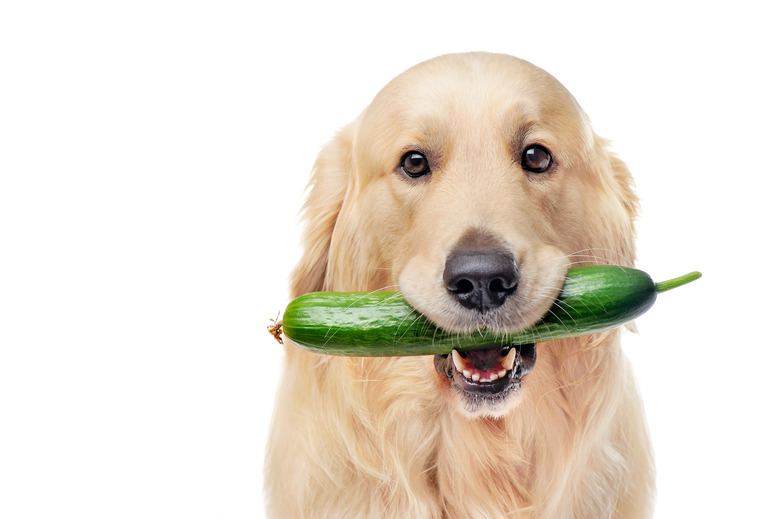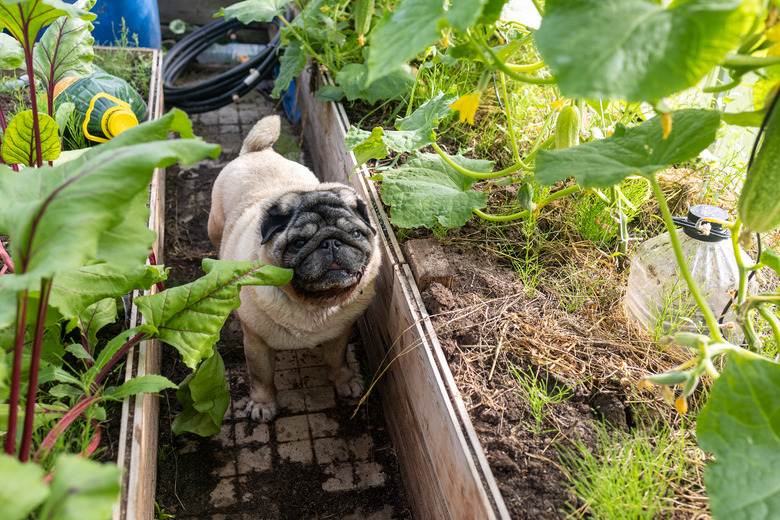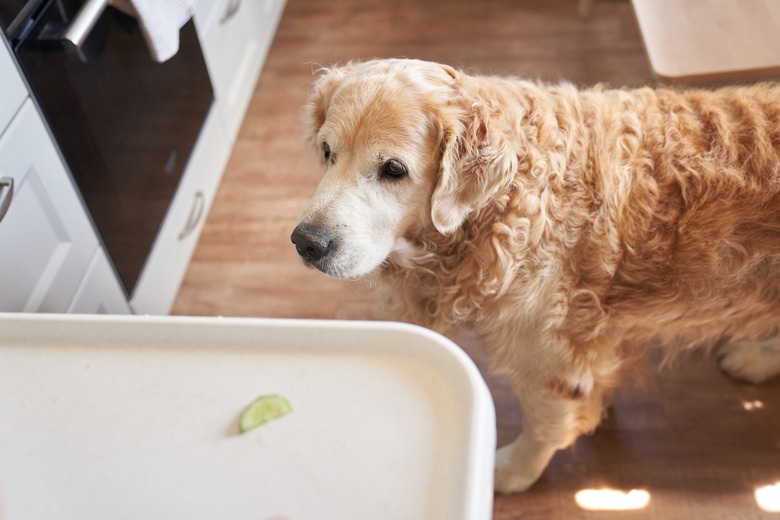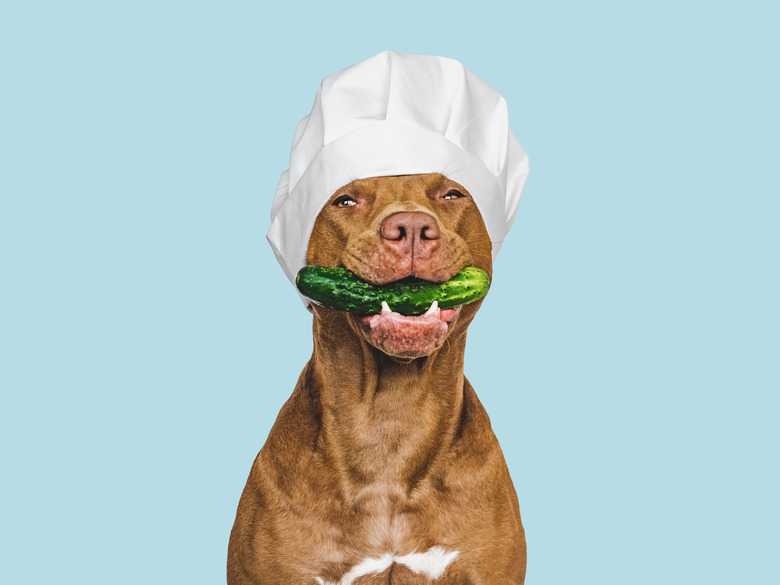Can Dogs Eat Cucumber? Even The Skin?
Can Dogs Eat Cucumber?
Does your dog ever get tired of their usual dog biscuit? Or do you just want to offer them something a little different every once in a while? Why not try a little bite of cucumber? Cucumber is one of the best snacks for dogs. It's very low in calories, super high in water content, and packed with vitamins, minerals, fiber, and antioxidants. Not sure if you're sold yet? Read on to learn whether cucumber is right for your dog, and the best way to feed it to them.
Are there health benefits of cucumber for dogs?
Are there health benefits of cucumber for dogs?
Yes, lots! One of the main health benefits of cucumbers for dogs, or people, for that matter, is that they are an excellent source of hydration thanks to their naturally high water content. In addition to that, they're also packed with electrolytes, which could be perfect for pets who are actively exercising, or feeling a little under the weather. Cucumber is also rich in vitamins like vitamin K, which supports healthy bones, as well as vitamin D, vitamin C, calcium, and magnesium.
Cucumber is also known for containing cucurbitacin, which may help stop the reproduction of cancer-causing cells in the body. One study even shows that this substance, which is found in cucumber skin, has regulated the release of insulin, which could control and even prevent diabetes.
The vitamins and minerals found in cucumber are in relatively small amounts when you compare it to the daily recommended dosage of each thing, so it's not advised that you rely only on cucumber to meet these dietary needs. Fortunately, cucumber is very low in calories, with a half cup measuring only eight calories in total. So, if you want to let your dog eat cucumber and your dog and has no trouble digesting it, you can feel good knowing it's a great, healthy treat to offer pretty much anytime you want.
Are there risks of giving a dog cucumber?
Are there risks of giving a dog cucumber?
The main risk of giving a dog cucumber to snack on is that it could be a choking hazard, which could happen if the slices are too big. Some dogs might also have trouble digesting the skin of the cucumber. That said, there are pretty simple fixes for each of these issues. First, be sure to slice or cube your dog's cucumber into bite-sized pieces, around the same size as their favorite dog treat. If your dog is having trouble digesting the cucumber peel, or if you just don't want to leave it to chance, peel the cucumber before you offer it to your canine friend.
Can dogs eat cucumber raw?
Can dogs eat cucumber raw?
Absolutely. Raw cucumber contains all of the wonderful benefits cucumber has to offer, like antioxidants, vitamins and minerals, fiber, hydration, potassium, and more. Eating raw pieces of cucumber offers nutritional value, can help freshen your dog's breath, and is a nice way to reward your dog with human foods that are healthy, inexpensive, and delicious.
Tip
Start by feeding your dog peeled and seeded cucumber slices to see how their stomach handles it before offering the seeds and skin.
Can dogs eat cucumber skin or peels?
Can dogs eat cucumber skin or peels?
Yes, dogs can eat the skins and peels of cucumber, but not every dog should. Some dogs' digestive systems may have trouble breaking down or passing these tough skins as they are very rich in fiber. Additionally, if you're not feeding your dog organic cucumber, the skin may be covered in protective wax that isn't likely to upset their stomach (after all, we eat this too!) but it certainly could, especially if your pooch already has a sensitive stomach.
That said, the cucumber peel is where nearly all of the nutritional benefits of cucumber are found, so if you're looking to add cucumber to your dog's diet and can leave the skin intact, you should.
Can dogs eat cucumber seeds?
Can dogs eat cucumber seeds?
Dogs can eat cucumber seeds, but like the skins, some dogs may have a tough time digesting them, so offer your dog seeds with caution. If your dog can stomach the seeds and skin it is a good idea to feed these to them as this is where most of the nutritious benefits are found. That said, if your dog does better without these cucumber parts, or if you're just looking to offer them a hydrating snack, then the rest of the cucumber is still a great healthy snack option, and something that can easily be added to their daily diet.
How to feed your dog cucumber
How to feed your dog cucumber
The best and safest way to feed your dog cucumber is to offer it to them in small pieces, just as you would a dog treat. Adding any new food to your dog's diet should be done slowly and with care, and cucumber and other fruits and veggies are no exception. Cucumber slices and cucumber bites are both safe ways to feed cucumber to your dog as a healthy treat.
How much cucumber can I give my dog?
How much cucumber can I give my dog?
The American Kennel Club recommends that cucumber make up no more than 10% of your dog's daily diet, and should really only be offered as a snack. Cucumbers, safe for dogs when prepared properly, can be a healthy and low-calorie treat. To reduce the chances of choking, or having cucumber become stuck in your dog's gastrointestinal system, don't give your dog a whole cucumber to munch on, instead, keep your cucumber treats in bite-sized pieces, or offer small slices of cucumber.
It's also recommended that you offer peeled and seeded cucumber at first to see how well your dog digests the veggie. Cucumber is an excellent healthy snack option that's loaded with vitamins, minerals, and phytonutrients, and is one of the best low-calorie snacks to offer your canine companion.
Here are some other FAQs people have about what they can feed dogs in addition to their regular dog food:
Here are some other FAQs people have about what they can feed dogs in addition to their regular dog food:
What other fruits can my dog eat?
What other fruits can my dog eat?
While cucumbers are safe for dogs, there are a lot of other fruits dogs can safely eat as well! Dogs can eat:
- apples (not crabapples though!)
- bananas
- blueberries
- cantaloupe
- mango
- pineapple
- peaches
- pears
- pumpkin
- raspberries
- strawberries
- watermelon
- Peanut butter, while not a fruit, is ok for dogs.
But, any dog has the potential to have an upset stomach if they eat too much of something or they eat foods that do not agree with them. So whenever you're feeding a dog something new, keep an eye on them and look for signs that the food may be upsetting their system.
What should my dog not eat?
What should my dog not eat?
Dogs should definitely not eat onions, garlic, and mushrooms, among other vegetables. Avoid feeding your dog foods with seasonings and fats because the seasonings may have these things in them along with salt and high fat content, which is also not good if a dog is overeating something other than their normal dog food. Another thing to keep in mind is if you are feeding your dog fruits and vegetables, you may want to seek out foods that are not sprayed with pesticides.




